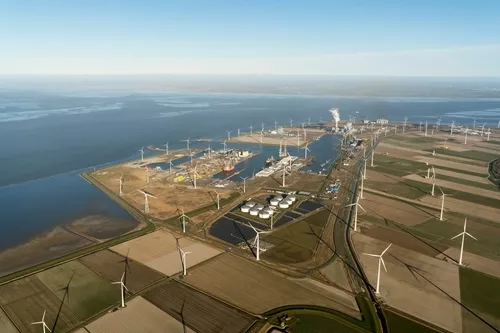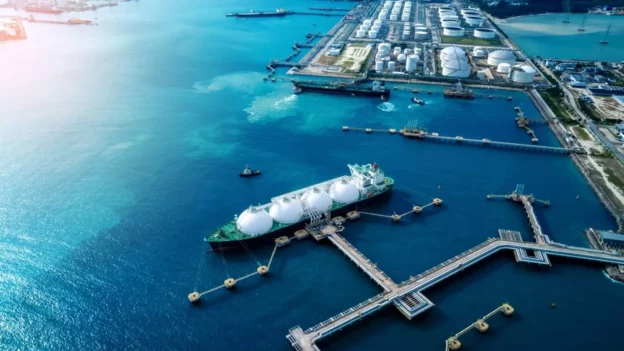Port logistics plays a pivotal role in the global supply chain, facilitating the efficient flow of goods and materials between different regions worldwide. Maritime transportation, as one of the most utilized means for international trade, holds particular significance for the Oil & Gas sector, where efficiency and safety are paramount. Maritime terminals serve as crucial points for loading and unloading products, and their proper management ensures uninterrupted goods flow.
Within this context, port logistics coordinates the operations and processes that keep maritime terminals functioning. Effective and strategic management of these operations is essential to avoid congestion and delays that could disrupt the entire supply chain. This article will delve into key strategies for efficient logistics at maritime terminals, with a focus on the Oil & Gas sector, highlighting how good management can enhance port efficiency and contribute to overall maritime transport success.
Strategic planning in port logistics
Strategic planning for ports is essential for the efficient operation of maritime terminals. In the context of the Oil & Gas sector, this planning involves the design and implementation of strategies to optimize the flow of goods and resources, minimize operating costs, and ensure safety in all operations.
Successful strategic planning is based on several key aspects. First, it’s necessary to have a clear understanding of the volume of cargo and the types of products handled at the port. In the Oil & Gas sector, this includes crude oil, refined products, and liquefied gases. Port infrastructure must be capable of supporting these operations safely and efficiently.
Second, coordination and communication among all stakeholders are critical. This involves working with port authorities, logistics companies, terminal operators, and maritime shipping companies to ensure all processes align with strategic objectives.
Third, the use of advanced technology can improve efficiency. Software solutions for port management, cargo tracking, and process automation are valuable tools that allow maritime terminals to reduce downtime and improve productivity.
Strategic planning can also significantly influence port efficiency. For instance, by implementing maritime traffic management systems and optimizing shipping routes, it’s possible to reduce ship waiting times and improve the overall performance of the port. Moreover, implementing rigorous safety practices is essential to prevent accidents and spills that could have considerable environmental and financial impacts.
Maritime terminals in the Oil & Gas sector that have implemented successful strategies focus on resource optimization, cost reduction, and maintaining high safety standards. An example is the use of automated mooring systems and efficient cranes to accelerate loading and unloading operations, allowing for greater throughput in less time.
Sustainable maritime transport
Sustainable maritime transport is crucial for the Oil & Gas sector, not only because it reduces environmental impact, but also because it can improve efficiency and lower costs. To implement sustainability in port logistics, maritime terminals can adopt various strategies.
One of the primary concerns is reducing emissions. To achieve this, cleaner fuels can be used, or certain operations can be electrified. Moreover, innovative technologies can contribute to sustainable maritime transport, such as the use of solar panels and wind turbines to reduce reliance on traditional fuels. Terminals can also implement waste management systems and recycling programs to minimize their environmental footprint. The following image shows a maritime terminal with multiple wind turbines and other infrastructure, highlighting the use of wind energy for sustainability in maritime transport.

The sustainability of ports has become a priority. Many maritime terminals have environmental monitoring programs to track and reduce their impact on the environment. For instance, in 2021, 86% of ports reported having an environmental monitoring program, and 75% achieved an environmental certification, such as ISO 14001 or EMAS. This demonstrates a commitment to sustainability standards and the adoption of more responsible practices.
Maritime terminals in the Oil & Gas sector are also taking measures to compensate for the environmental impact of their operations. Some implement reforestation programs and coastal area restoration, while others use carbon capture technologies to reduce emissions and contribute to a cleaner environment. By adopting these practices, ports can improve efficiency and maintain competitiveness while contributing to a healthier environment.
With these strategies, sustainable maritime transport can become a reality, ensuring efficient and environmentally conscious port logistics.
Port efficiency
It is essential for the optimal operation of maritime terminals in the Oil & Gas sector, where cargo volume and safety are critical. To achieve this, several key elements must be considered. First, port infrastructure should be designed to handle large volumes of cargo safely, including crude oil, refined products, and liquefied gases. High-capacity cranes, specialized storage systems, and advanced technologies for cargo tracking are essential components for these types of terminals.
Efficiency in maritime and port operations is crucial for reducing costs and minimizing risks. An efficient port operation involves smooth coordination among all stakeholders, from port operators to logistics companies and maritime authorities. The use of advanced technologies like Terminal Operating Systems (TOS) and robots for transporting and handling cargo can significantly improve efficiency.
Innovations and technologies play an important role in improving port efficiency. Maritime terminals in the Oil & Gas sector are adopting advanced management systems to streamline processes and minimize errors. However, common challenges such as congestion and a lack of skilled personnel still exist. To overcome these, it’s important to implement traffic management systems and training programs for staff.
Maritime logistics
Maritime logistics are critical in the Oil & Gas sector, as they involve the transport and coordination of highly specialized products; poor planning can lead to delays, additional costs, and safety risks. Therefore, the relationship between port logistics and maritime logistics is fundamental to maintaining a smooth flow of operations.
To optimize maritime logistics in the Oil & Gas sector, having a good routing plan and close collaboration between different stakeholders, such as transport companies, port operators, and maritime authorities, is essential. This ensures a smooth flow of information and efficient processes. The use of advanced tracking and automation technologies can benefit maritime logistics and, in turn, improve terminal efficiency.
Conclusions
In summary, port logistics play a crucial role in the Oil & Gas sector by enabling the efficient flow of goods and materials in the global supply chain. Strategic planning, sustainable maritime transport, and port efficiency are key elements in ensuring the optimal operation of maritime terminals.
Sustainable maritime transport is a crucial aspect, as it reduces environmental impact and can improve efficiency while reducing costs. Various strategies, such as emission reduction, cleaner fuels, and waste management, contribute to more sustainable maritime transport. The adoption of advanced technologies is also essential for optimizing operations and maintaining high efficiency.
Efficient port logistics can have significant implications for the future of port and maritime operations. By coordinating operations effectively and using modern technologies, maritime terminals can maintain competitiveness in the Oil & Gas sector and contribute to a healthier environment. With a strategic focus and sustainable practices, maritime terminals can achieve high levels of efficiency and reduce their environmental impact. This ensures that port logistics remain a vital component of maritime transport’s overall success and sustainable growth in the Oil & Gas sector.
References
Own source.


